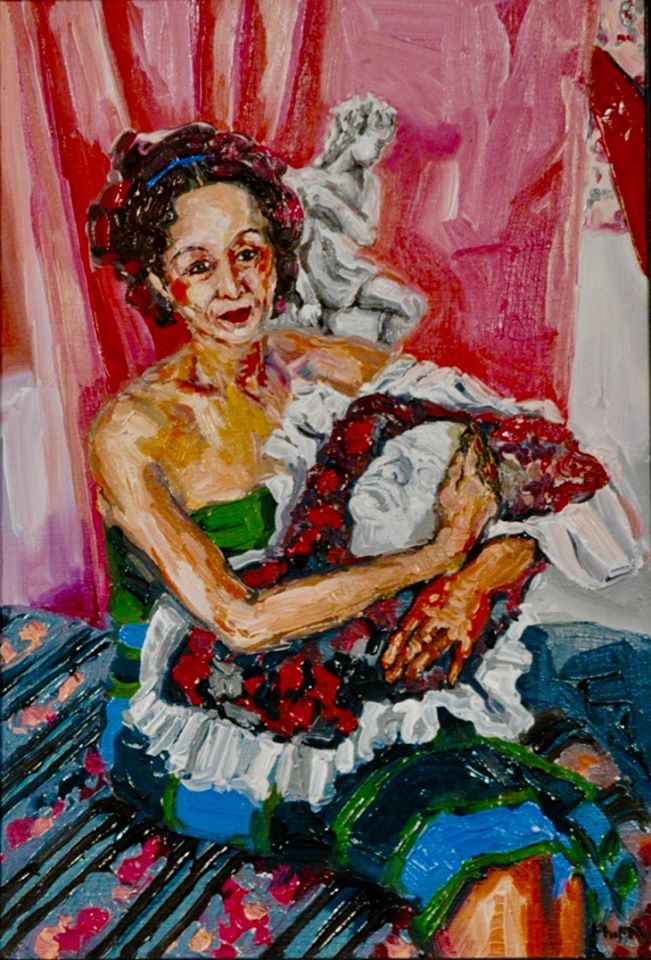
Portrait of my mother by Marilène Phipps. She is holding her father’s death mask. He was a surgeon, his students loved him and made the mask when he died.
Home can be lost even before you leave it. Millie’s house in Haiti was like a mouth with a roomful of decay. Cream-colored walls became streaked with long traces of black mold because the corrugated-iron roof had rusted in many parts and no longer kept the house safe from the drippings of rain. The front gallery had arches that seemed brave and bold in the wide curve they held up in spite of crumbling cement and loosening bricks.
Millie and I were in the same class. Her house stood next door to our school. I was never invited to come in when I came to play with her on weekends, and my mother had dropped me off. My six-year-old friend would show up on the front gallery like a baby’s new tooth, glistening and jovial. We then went to the schoolyard to play a game of osselets with the goats’ spinal bones the cook bought for me in the meat section of the downtown Port-au-Prince open market.
When Auxilia came back home from shopping at the market for the week’s groceries, she first took the osselets carefully out of the crumpled newspaper wrapping that smelled of putrid blood. She boiled for a long while these delicate bits of ossein matter once crucial to an animal’s life. She handed them to me as soon as they were rid of excess cartilage, blood and dirt. I held them like precious gems. How pristine and light! I felt the four different facets of the misshapen cube-like bones with my fingertips—the round back, the opposite hollow, and two sides resembling either an “S” or an “I.”
Millie tossed the bones in the air with such a graceful hand, mysteriously at ease with death’s face and devices. Only one hand is used throughout the game. The higher you toss the one bone in the air, the more time you have to shift and match the sides of the other four lined up on the ground. We were both right-handed. She won the game every time, determined not to resemble her parents in their failings.
I remember her father as long and yellowed. He was always stretched out in a decrepit chaise-longue on the front gallery of their house. He yawned often, wore floppy pajama bottoms and thin-ribbed, sleeveless t-shirts that let his skinny white arms dry up in the tropical sun. He died early. His wife then roamed through the remains of her life that must at times have looked as dark as her skin and that of the silent cook who worked for room and board. The crone always waved back at me from the fading embers of her charcoal stove, beaming a toothless smile. I could barely make her out in the dim space used for cooking beyond the gallery while all doors and windows of the house were continually kept ajar.
On a rickety hand-spun sewing machine, Millie’s mother sewed a high-collared, white lace blouse that made her daughter look like a Polynesian princess. Millie had turned sixteen. She inherited her father’s straight, black hair, which she let grow past her waist and always wore loose. She smiled when I touched it. In a country of black people miserably self-conscious of their kinky hair, Millie was a wonder. Perhaps her mother also sewed her wedding dress, before she watched her beautiful child leave Haiti with a new husband, a Frenchman like her father. This young man was however not a failed adventurer to the colonies, but a bourgeois journalist, a studious collector of world news and rare exotica.
—Marilène Phipps first published on her Facebook page on November 5th 2019. You may read more of Phipps’ blog on her web site
Marilène Phipps has recently released the memoir Unseen Worlds: Adventures at the Crossroads of Vodou Spirits and Latter-day Saints (Calumet Editions), of which The Boston Globe says Phipps’ language is “lush, sinuous, each paragraph holds poetry, and her ‘Unseen Worlds’ is undeniably a memorable memoir.” Phipps is now preparing the publication of a new book House of Fossils, to be released in March 2020.
